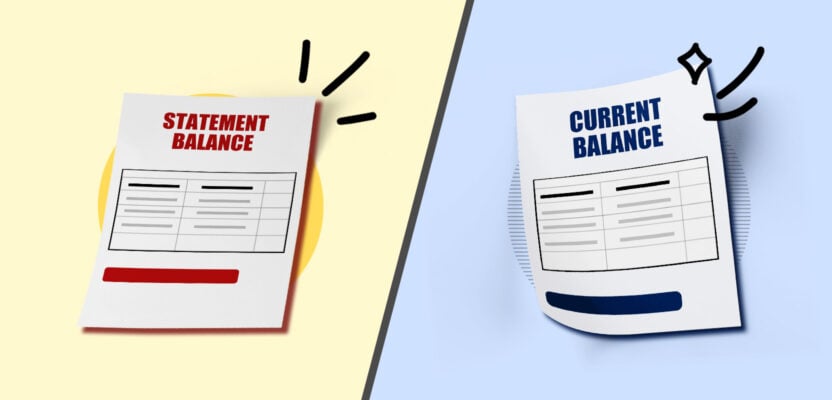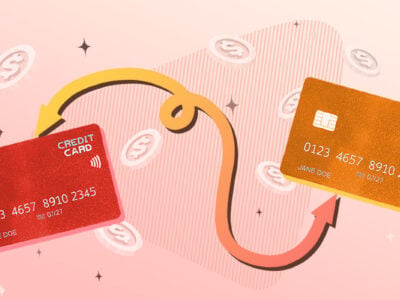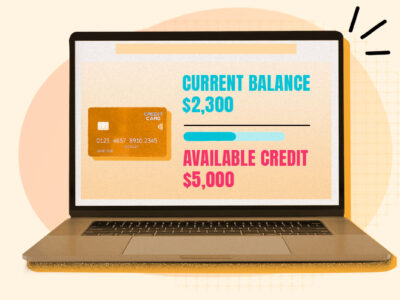Credit card terminology can be tricky, but not understanding the dates, rates, and terms on your credit card is dangerous.
To avoid paying late fees and interest and causing damage to your credit score, make sure you understand the difference between your statement balance and current balance and which one you should prioritize paying.
Table of Contents
What is a statement balance?
Your statement balance is the amount of money you owe at the end of your monthly credit card billing cycle. Your statement balance will include:
- Charges you made during that billing cycle
- Unpaid debts from previous billing cycles
- Interest charges
- Fees associated with your credit account (e.g., your credit card’s annual fee)
Your statement balance is calculated on your credit card’s statement closing date, which is the last day of your billing cycle. This date will always be 21 or more days before your statement due date (the date on which you actually have to pay). This gives your lender time to send you your credit card statement and gives you time to pay.
What is a current balance?
Your current balance is the total amount you owe on your credit card as of today.
Unlike your statement balance, your current balance isn’t calculated at the end of your billing cycle. Rather, it’s your entire outstanding balance (or unpaid credit card debt) at the moment that you check it.
Your current balance is calculated by adding together any charges from your statement balance that haven’t been paid off (including interest) and any charges you’ve made in your new billing cycle.
Why your statement balance and current balance might be different
You may notice that your last statement balance and your current balance are often different. Here’s why this can happen:
Why your current balance might be higher than your statement balance
If your current balance is higher than your previous statement balance, it probably means that you’ve made purchases since the end of your last billing cycle without paying your previous balance off.
Here’s an example:
- Your last billing cycle ended on May 10.
- Your statement balance for that billing cycle was $1,000.
- You haven’t paid any of that off yet.
- You spent a further $50 on May 15.
- Your current balance now shows $1,050 (statement balance + new charges).
In this example, your current balance is $50 higher than your statement balance because you made new charges without paying any of your old debt off.
Why your statement balance might be higher than your current balance
If your statement balance is higher than your current balance, it’s because you’ve paid off some or all of your statement balance since you received it.
Here’s another example to illustrate this:
- Your last billing cycle ended on May 10.
- Your statement balance for that billing cycle was $1,000.
- You spent $50 on May 15, but on May 16, you also made a credit card payment of $500.
- Your current balance now shows $550 (statement balance + new charges – your payment)
In this example, your current balance is $450 lower than your statement balance because you paid off more of your last cycle’s balance than you spent during your new cycle.
To sum things up, your statement balance is a snapshot of your card at a particular moment in time (the end of your billing cycle). It won’t change after your statement closing date. Conversely, your current balance is continually updated as you make new charges or pay off old ones. This explains how your balances can differ in either direction.
Should you pay your statement balance or current balance?
You should always prioritize paying your statement balance to avoid interest charges and late fees.
As long as you pay off your statement balance in full, you won’t pay any interest on your credit card. You don’t need to pay off your entire current balance to avoid interest charges.
How to prioritize your credit card payments
In more detail, here’s the order in which you should prioritize paying off your bills:
- Minimum monthly payment: If you can’t afford to pay off your entire statement balance, make sure you at least pay your monthly minimum by your due date. Paying this off isn’t optional—failure to do so could lead to you getting hit with late fees, being forced to pay a penalty APR, and suffering damage to your credit score.
- Statement balance: If you can afford to pay off your entire statement balance, do so. By paying off your credit card in full by the due date, you’ll avoid getting charged interest and potentially improve your credit score.
- Current balance: If you’ve paid off your statement balance and still have money to spare, you can also pay off your entire current balance. This isn’t necessary to avoid paying interest, but it will keep your credit card in the best standing possible and lower your debt-to-credit ratio (which helps your credit score).
How paying off your statement balance helps you avoid interest charges
Many credit cards offer a grace period, which is usually a 21–30 day period after your statement closing date that allows you to make interest-free charges to your card.
You’ll only get your grace period if you pay your previous month’s statement balance by the due date. Otherwise, purchases made during your grace period will be subject to the usual interest rate.
How do your statement and current balances affect your credit score?
Your statement balance and current balance both affect two of the factors used in the calculation of your credit score:
1. Credit utilization rate
Your credit utilization rate (also known as your debt-to-credit ratio) is the amount of your total credit that you’re currently using. It’s calculated by dividing your current balance across your credit cards by your total credit limit across all your cards (i.e., adding up all your credit limits).
A lower credit limit is better for your credit score, with many experts claiming that a utilization rate of below 30% is good and a utilization rate of under 10% is ideal.
Your credit utilization rate is calculated when your credit card issuers report your balance to the credit bureaus. Usually, they’ll do this on or right after your statement closing date. That means that if you haven’t paid off any of your outstanding balance before your statement closing date, your credit utilization rate may be higher than you want it.
If you’re trying to maximize your credit score, pay your credit card bill at the right time. If you pay off your statement balance before the statement closing date (aka the last day of your billing cycle), your card issuer will report a lower credit utilization rate, benefiting your score.
2. Payment history
The most important factor affecting your credit score is your payment history (the record of whether you’ve paid your bills on time). Failing to pay your statement balance on time can hurt your payment history if you miss a payment or rack up interest charges that make meeting your monthly bills too difficult.
Even a single late payment can be deadly to your credit score. Keep your balances as low as possible to reduce the risk of missing payments.






